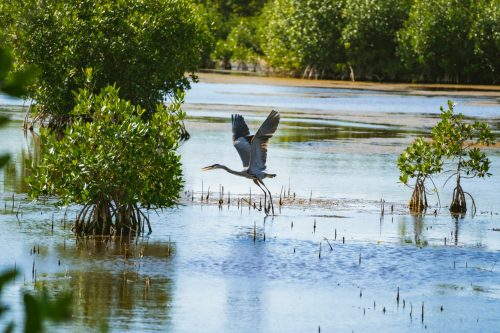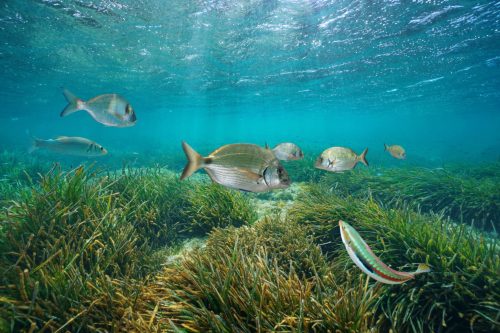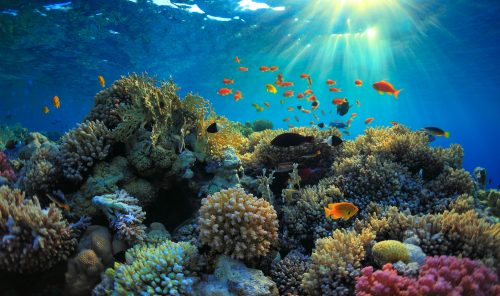Coastal Management: Importance and Challenges in Facing Anthropogenic Activities

Photo Credit : Damocean/iStock
Coastlines are not only sources of natural beauty, but they also protect a number of essential natural resources for life on this planet. From stunning mangrove forests to mesmerizing seagrass and coral reef ecosystems, this article will discuss the diversity of coastal natural resources, their interactions, and their crucial role in supporting other life forms.
Coastal Natural Resources consist of mangroves, seagrass, and corals.
Mangroves : Mangrove forests not only provide a unique habitat but also protect the coast from storm surges and retain sedimentation. Mangroves are the spawning grounds for many fish species, which are an important resource for local fishermen.

Photo Credit : Jason Heid/iStock
Seagrass : Seagrass ecosystems are home to various marine organisms, such as fish, shrimp, and crabs. Seagrass also plays a vital role in maintaining water quality and providing food for marine animals.

Photo Credit : Damocean/iStock
Corals : Coral reefs are underwater wonders that support rich marine life. Corals provide shelter and breeding grounds for fish, maintaining marine biodiversity.

Photo Credit : IBorisoff/iStock
Mangroves, seagrass, and corals are interconnected in the cycle of life. Mangroves provide spawning grounds and food for fish, which then migrate to seagrass and coral reef ecosystems for breeding and shelter. These ecosystems create ecological balance by filtering water, sequestering carbon, and involving biogeochemical processes that support marine life as a whole.
Important Role in Supporting Other Life Forms
- Fishery Resources : Mangrove forests and seagrass ecosystems serve as natural nurseries for young fish, which then spread to open waters and support the fishing industry.
- Biodiversity Conservation : Coral reefs support marine biodiversity by providing habitats for various species, including those that are endangered.
- Coastal Defence : Mangrove forests and coral reefs act as natural fortresses, protecting the coast from the impacts of storm surges and coastal erosion.
These ecosystems play a vital role in maintaining the delicate balance of coastal environment. However, despite their crucial functions, coastal areas face numerous threats from anthropogenic activities that can undermine the health and sustainability of these ecosystems.
The degradation of coastal resource, that primarily caused by anthropogenic activities, results in significant consequences, including decline in water quality, loss of species habitats, and an increased risk of natural disasters such as floods. Furtheremore, damaged coastal ecosystems can lead to local economic instability and threaten the sustainability of resources.
Therefore, it is important to understand that coastal management involves various sectors. Cross-sectoral coordination is needed to face complex challenges and ensure coastal sustainability.
Goals of Integrated Coastal Management (ICM)
Adopting the ICM concept is key to protecting and restoring coastal ecosystems. Some ICM goals include:
- Ecosystem Recovery : Restore and preserve important coastal habitats such as mangrove forests.
- Resource Management : Maintain a balance between human needs and the maintenance of coastal resources.
- Prevention of Damage : Identify and prevent anthropogenic activities that can damage the coast.
- Community Involvement : Involve local communities in decision-making and coastal environmental protection.
Through integrated coastal management, we can maintain the sustainability of coastal ecosystems for future generations, while ensuring that human needs can be met sustainably. Awareness and cross-sectoral cooperation are key to achieving this goal.

